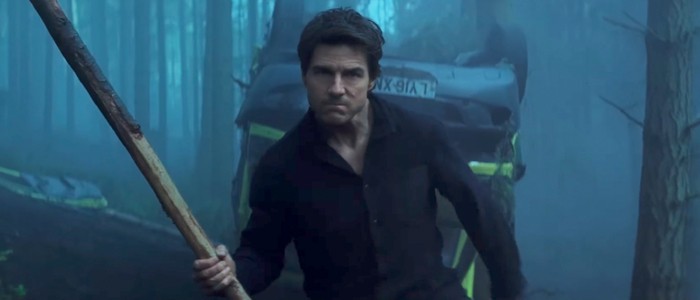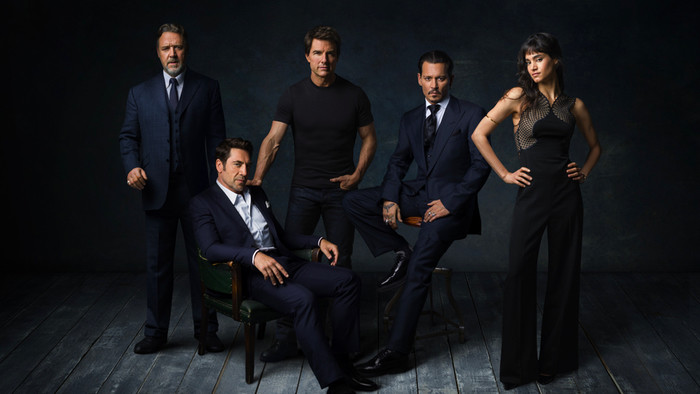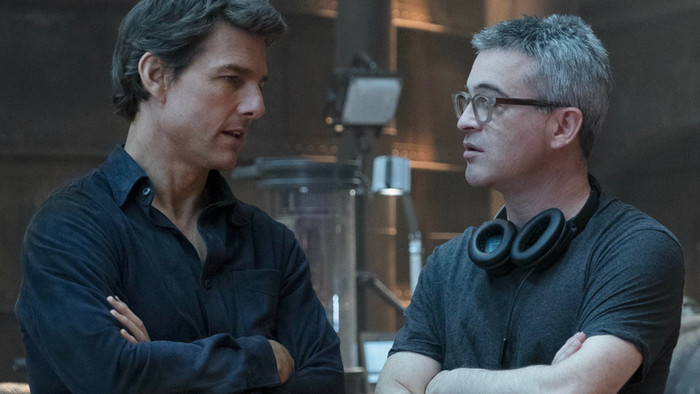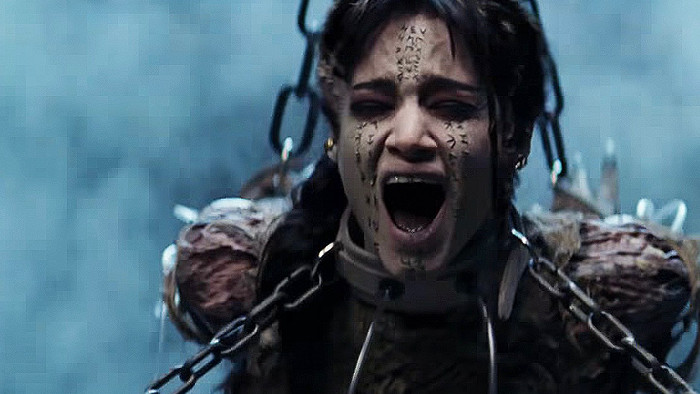The Lessons Universal (And Hollywood) Should Learn From 'The Mummy'
Remember The Mummy? It hit theaters...*checks notes*...two weeks ago? Wow, time sure flies when you're trying to forget you saw a certain movie.The Mummy was sold as a film featuring Tom Cruise doing battle with a recently resurrected mummy, but mostly it sat there, lifeless and entirely void of any entertainment value, all thanks to a muddled script, slipshod editing, and bland direction. The film underperformed at the box office, an inauspicious start to Universal's proposed "Dark Universe" franchise, which, for some strange reason, is supposed to turn the classic Universal Monsters into action heroes akin to the superheroes of the Marvel Cinematic Universe. The Mummy also ended up being one of the worst-reviewed films of Tom Cruise's career, second only to Cocktail. Truly, this is a dark time for mummies and Tom Cruises everywhere.What happens next? Where does Universal go from here? What lessons, if any, can Hollywood and Universal Pictures take away from this lifeless corpse of a film? Let's light our torches, break the seal on this tomb and go exploring. 
Star Power is a Thing of the Past
I'm not here to besmirch Tom Cruise. I like Tom Cruise as an actor. He's an entertaining showman who loves risking his life to make (mostly) fun movies, and every once in awhile, he appears in something like Eyes Wide Shut or Magnolia to show people he has some range. Recently, a story in Variety had Universal Studio insiders trying to push all the blame for The Mummy onto Cruise. Per Variety, the original Mummy script was much more of an exciting summer horror movie, and Sofia Boutella's eponymous mummy had as much screentime as Cruise's character. Once Cruise came in, however, everything changed as he and his team reworked the film to better complement the actor. "This is very much a film of two halves: before Tom and after Tom," the Variety story quotes Frank Walsh, The Mummy supervising art director, as saying. I don't doubt this story for a second. However, this is nothing new. Cruise more or less has done this on all of his films for the last decade. According to Kim Masters in The Daily Beast, at one point the actor had a team of screenwriters "picking up $250,000 a week to rework scripts that Cruise might pick for his next project." This is the sort of thing that comes with hiring a big movie star. Here's the problem, though: the age of the movie star is over. Indiewire's David Ehrlich summed things up nicely in his article "Alden Ehrenreich Playing Han Solo is Proof That Movie Stardom is Dead" when he wrote "We used to create movie stars, but now we only create movie stardom." There was a time when a little-known actor like Alden Ehrenreich would never have been considered to play such a big role in a major blockbuster tentpole such as the Han Solo movie. But audiences don't generally think in terms of star power anymore when deciding on what movie to see. Star power means very little these days.Chris Pratt has gone from goofy sitcom player to big budget megastar, but does anyone – other than Pratt's agent, perhaps – honestly think that Jurassic World did boffo box office because Pratt was in it? If that were the case, then why did Passengers, a film that paired Pratt with another big star, Jennifer Lawrence, fizzle at multiplexes across the country? Cruise may be the last of the true original movie stars, but studios need to realize that doesn't carry the same weight as it used to. Universal seemed to think that by putting Cruise front and center for their first Dark Universe movie they didn't have to worry too much about pesky little matters like "plot" and "coherent editing." The Variety piece even somewhat acknowledges this sea change in audience reaction to stars with this excerpt: "Universal knew that if it wanted The Mummy to compete against the likes of Wonder Woman and Guardians of the Galaxy Vol. 2 it needed every ounce of Cruise's waning star power. As the studio scrambled to deal with weak tracking, it released a portrait in late May of Cruise with other actors from the Dark Universe franchise, including [Johnny] Depp and Javier Bardem (who will play Frankenstein). Yet the studio couldn't even assemble all the actors in the room at the same time, and the image had to be Photoshopped. The Internet reaction to the last-ditch marketing effort was tepid at best."None of this is Cruise's fault, but it is unfortunate that he failed to realize the state of things while he was reshaping The Mummy. The Mission: Impossible films became truly engaging when they started to focus more on the team Cruise's character surrounds himself with than just Cruise himself. The recent Mission: Impossible: Rogue Nation was less a showcase for Cruise than it was for Rebecca Ferguson, playing ass-kicking double-agent Ilsa Faust. And Cruise wisely let Edge of Tomorrow (or Live. Die. Repeat., if you want to be a weirdo about it) shift focus away from his character and on to Emily Blunt's. These were two of the most-celebrated films of Cruise's recent career, so you'd think he'd realize that had he let Boutella share the spotlight in The Mummy, the film would've been better-off. Hell, it's bad enough that the mummy in The Mummy barely has any screentime, but equally bad is the way the film handles leading lady Annabelle Wallis, who doesn't so much play a character in the film as she does a fountain of pointless exposition. If Universal's Dark Universe wants to expand, it needs to realize that a universe is bigger than one man. Relying so heavily on one actor to launch an entire world is just silly.
Focus on One Film at a Time
I can't believe I even need to say this, but it's okay to make a big movie that doesn't launch a cinematic universe. I know Marvel cracked the formula and created a license to print money in the process, but they're the rare successful example. I get it: studios want a return on their investment. If they're going to shell out the cash, they want to turn a profit. What better way than to create not just one film but a whole universe of films?Counterpoint: you can make a big movie that stands on its own that still makes plenty of money. The best modern example is Christopher Nolan, who has spent a large chunk of his career creating big blockbusters that stand alone without launching entire franchises. Even when Nolan was working within the confines of a franchise with his Dark Knight trilogy, the filmmaker would frequently say he wasn't thinking about sequels, he was only focusing on the film at hand.Perhaps that's the example studios would be wise to follow. If they must start their own cinematic universes, why not worry about them one film at a time. The Mummy feels like a 2-hour warm-up act. There's nothing distinct in the film; nothing to make it stand-out on its own. Every frame seems tailor-made to set-up this cinematic universe, which completely robs The Mummy of any power it might have had.If you want to get audiences excited for the next film in your series, you need to excite them with the film at hand. Personally speaking, had The Mummy been a fun summer movie with its own unique charms, I'd be thrilled to see where the Dark Universe goes. With The Mummy being the drab mess that it is, however, I'd be perfectly content if Universal never bothered to make any more of these films. If you go out to dinner only to find broken glass ground up into the first course of your meal, you probably wouldn't feel like sticking around to find out how the second course tasted.With the Marvel Cinematic Universe, audiences clamored for more because they were excited about the characters Marvel was focusing on. It was thrilling to imagine how these comic book heroes would eventually intersect into each other's worlds. What characters are we supposed to be excited about with the Dark Universe? It's certainly can't be the human heroes, who as established by The Mummy are all bland and unremarkable. Is it the monsters, then? That's hard to believe too, since The Mummy spends a good amount of its runtime ignoring its central monster, only to quickly dispatch her at the end in order for Cruise to take over.If studios want audiences to return to the worlds they create, they have to make those worlds exciting, and populate them with individuals worth giving a damn about. Otherwise the entire endeavor is pointless. Universal would be wise to make their next Dark Universe film, The Bride of Frankenstein, distinct and memorable, or else they're wasting everyone's time.
Think Smaller and Hire a Director With Vision
Does anyone know why any of the proposed Dark Universe films need to be constructed as big budget blockbusters? Universal is drawing on their classic monsters here, characters who inhabited dark black and white films about tragedy and death. What is the appeal in transporting them into Transformers-style action flicks?If Universal is counting on brand recognition, they're showing a complete lack of understanding of that brand. Anyone who counts themselves a fan of Universal's classic monsters likely wasn't clamoring to see these characters engage in slow-motion smack-downs while a cavalcade of CGI swirls around them.There's no reason to shy away from the horror elements of these films. Early in production, Russell Crowe, who plays Dr. Jekyll (why?) in the film, claimed that The Mummy was being "designed to seriously scare the s– out of you." Perhaps he was referring to the original script before Cruise brought in his own writers, Christopher McQuarrie and Dylan Kussman, to punch things up. The film as it exists now isn't even close to resembling horror, despite the fact that horror has constantly over-performs at the box office.Jordan Peele's Get Out, which Universal distributed, grossed $250.2 million worldwide on a production budget of $4.5 million. If Universal had gone smaller with The Mummy and crafted a lower-budgeted horror show, they might be singing a different tune today. The film could've easily recouped costs and actually been good in the process.Get Out was something of a risk because at the time Jordan Peele was untested as a filmmaker. Yet he was clearly a director with a vision, and that makes all the difference. Studios frequently hire untested or indie directors to helm their big projects as a power move – it's much easier to push around an untested filmmaker than one with clout. But the films that end up being successful are often helmed by a director with some semblance of vision. The Mummy is helmed by Alex Kurtzman, who only has one other directorial credit to his name, the forgotten People Like Us. From the look of The Mummy, Kurtzman has absolutely no discernible style of his own. He merely points and shoots, robbing the film of any personality. Surely there were better filmmakers to entrust with the origin of a cinematic universe.
Hey, Maybe None of This Matters!
Now it's time for the blunt honest truth: maybe none of this even matters! As THR reports, The Mummy may not be doing well in the United States, but it's cleaning-up overseas: "While the Tom Cruise starrer might be lagging in the U.S., it continues to do solid business overseas, where it won the weekend with $53 million from 68 markets for a foreign total of $239.1 million and global cume of $295.6 million."International box office plays a large part in studios recouping a film's budget, and there's a good chance numbers like this will ensure that Universal plows ahead with their Dark Universe, negative reviews be damned. Besides, what do poor reviews matter when filmmakers leap to defend their inferior product by claiming they "made it for the fans"? "This is a movie that I think is made for audiences," Kurtzman told Business Insider, "and in my experience, critics and audiences don't always sing the same song." The "made for fans, not critics" defense is beyond laughable, because by their very nature, film critics are movie fans. That's the entire reason they got into the extremely unlucrative film critic game to begin with. Yet time and time again, filmmakers or actors will trot out this defense, and more often than not, hardcore fans will buy into it.There's always a chance, though. Maybe Universal will learn from their Mummy mistakes. Maybe. Maybe when Bride of Frankenstein is about to hit theaters, producers will sit down for interviews and claim they've learned the error of their ways and have done their absolute best to listen to audiences and course-correct. And maybe after they say that, we'll all see they're completely full of it, and the film will be just as disastrous as The Mummy. Maybe in the end, we're cursed to suffer through more and more unimaginative, dull blockbusters that bore more than they excite.That's a fate far scarier than any undead creature.
